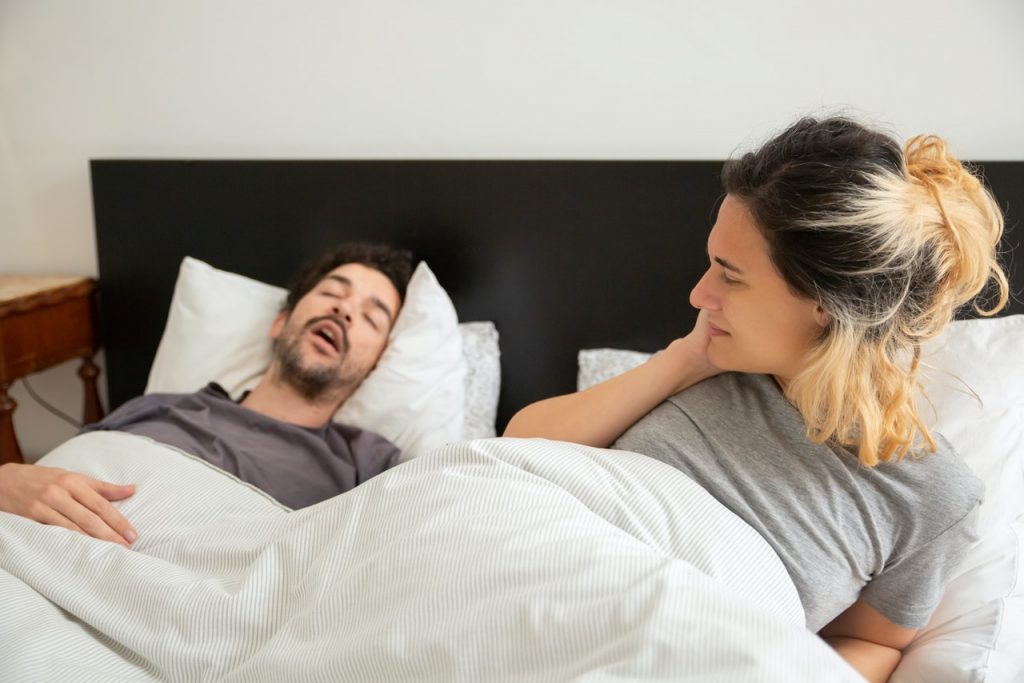
If you can’t fall asleep or you are tired during the day, it might be because of the noises inside or outside your house. Sleep disturbances caused by too much noise have immediate effects and cause short-term problems the next day and long-term mental and physical repercussions over time.
What are sleep stages?
To understand how noise can affect your sleep, it’s essential to distinguish the stages of sleep. Sleep stages are the various types of sleep we go through each night, ranging from the two lighter to two deep sleep phases: slow-wave and rapid eye movement (REM).
Every one of these components has a distinct purpose and function in maintaining your brain’s overall cognitive function. Some phases also involve bodily repairs that help you stay healthy and ready for the next day.
Every night, the whole sleep cycle repeats itself several times, with each successive REM stage lasting longer and inducing a deeper level of sleep.
When you sleep, your brain goes through four sleep cycle stages. Stages from one to 3 are non-rapid eye movement (NREM) sleep. The last one is called the REM stage, where rapid eye movement occurs.
NREM Stage 1 – transition stage between awakeness and sleep where you relax and your body slows down. It lasts about 10 minutes.
NREM Stage 2 – the stage where your body temperature drops and the brain wave activity starts. This stage takes up 50% of total sleep time and lasts for about 20 minutes per cycle.
NREM Stage 3 – the stage where delta brain waves activity occurs and the muscles are completely relaxed.
REM Stage – the deep sleep stage where dreaming happens as the brain activity is closest to awakening time. Your body is completely immobile, but breathing becomes faster and less regular.
When Should Child Stop Napping?
How noise affects your sleep
Noises during the night can cause sleep disturbances by waking you up. However, by altering the length of time people spend in particular sleep phases, even the noises that don’t wake you up have subconscious consequences on sleep. For example, vehicle and air noise has been linked to an increase in stage 1 sleep and a decrease in slow-wave and REM sleep.
Extra hormone production of adrenaline and cortisol and increased heart rate and blood pressure are all possible effects of nighttime noise.
According to a study, noise trauma at night was found to be more sensitive than during the day in mice, which suggests that this sensitivity may also apply to human circadian rhythms.

Short term consequences of nighttime noise
Getting enough quality sleep is critical for well-being and health. Although you might not notice changes to your sleep cycle and biochemical changes in your brain, they can be more pronounced the next day. Tiredness, irritability, and symptoms of depression are often the effect of exposure to nighttime noise the night before.
How Much Should Babies and Kids Sleep?
Long term consequences of nighttime noise
Poor sleep quality due to background noise can cause high blood pressure, heart disease, weight gain, type 2 diabetes, and different types of cancer. The link between nighttime noise and long-term health effects is not clear. However, studies indicate an association with high blood pressure, heart disease, and stroke. Moreover, the increased use of sleep medications and decreased overall health.
How to avoid nighttime noises
Noise pollution is an everyday struggle when you live in a city, and sometimes it’s unavoidable. Even very quiet sounds can get irritating after a while.
Here are a few tips that might help you sleep better:
Soundproof your windows
If loud noises from the outside are disturbing your sleep, consider insulating windows and closing any air gaps in the windows you have. You can use what you already have at home, like rugs or sheets.
Bring soft materials to the bedroom
The noise bounces back out of hard surfaces, so it’s important to have soft and fluffy materials in the bedroom. Sound masks can be found online, but they might not offer the same quality or durability. Some manufacturers make sound masks with hypoallergenic materials, such as latex and foam. If you’re dealing with a noisy neighbor or loud music coming from your home’s walls, consider adding rugs, cushioned furniture, or thick curtains throughout your bedroom.
Turn off notifications
Many of us use an alarm clock on our phones to wake up in the morning, so it can be impossible to completely switch off the phone. However, you should keep your phone silent and turn off notifications and alerts. You can also use “do not disturb” mode or airplane mode.

Reduce noise in the house
Various appliances in the house may make noises that make it hard to fall asleep if you can turn them off for the night or replace them with more quiet alternatives. It would help if you also had your doors closed for the night as it can reduce the background noises coming from your environment.
Use earplugs
If you can’t soundproof, your bedroom earplugs can be useful if they don’t cause you to sleep less effectively. For example, a study proved that patients who used earplugs and an eye mask in the hospital woke up less frequently and had more profound sleep than those who didn’t.
Alternatives to earplugs include noise-canceling headphones that are small, lightweight, and comfortable; these may be used to block out sound while also allowing you to play soothing music before bed.
ASMR For Sleep – Can ASMR Help You Sleep Better?
Talk to your housemates
The noise in your house can often be caused by people living with you or your neighbors. If your home’s major noise source is other people, speak with them about how they can help you to get the sleep you need and how you may return the favor. Of course, some noise at night is unavoidable when you operate on different sleep cycles. Still, you might attempt to establish quiet hours rules. It may be useful to ask that your spouse or roommate use headphones while watching TV or listening to music and avoid speaking on the phone in your room while you are sleeping, for example. Planning by preparing meals and laying out the clothes for the next day during waking hours can also help avoid interruption.
If your spouse’s snoring keeps you up, talk to them about it. Lifestyle modifications or anti-snoring mouthpieces may help. Obstructive sleep apnea symptoms include extremely loud snoring and choking or gasping noises at night. If you notice any of these indications in your partner, see a doctor.
When can nighttime noise be good for you?
Is there any case where the noise can be good for you and help you sleep? It turns out there is.
Background noise may conceal or drown out noises you can’t influence and could help to counteract the negative effects of noise pollution during sleep. Background noise has also been found to assist people in avoiding anxious or worrisome thoughts by distracting them.
The greatest night sounds for sleeping vary from person to person, but make use of loud noises enough to mask other noises and maintain an even tone and volume; abrupt sound changes might cause you to wake up. Experiment with a few things until you discover what works best for you. Here are some suggestions:
White noise: White noise is multiple sound frequencies layered simultaneously. There are white noise machines you can buy, or you can also download a white noise app to your smartphone or tablet.
Music: Music can be soothing and sleep-inducing, depending on your musical taste. You can make a playlist of songs that are relaxing to you or find premade sleep playlists.
Sounds of nature: Rain, ocean, wind, and other natural sounds can induce sleep. Some sound machines have a programmed selection of sounds you can choose from. You can also download an app or sound files.

Conclusion
Noise can affect your sleep in different ways. If you’re trying to fall asleep, noise can be good or bad for you. You can use earplugs or headphones to cancel out noise. If your spouse’s snoring keeps you up, you may want to talk to them about it. Background noise such as white noise can also help mask other noises. Experiment to find out what works best for you.
